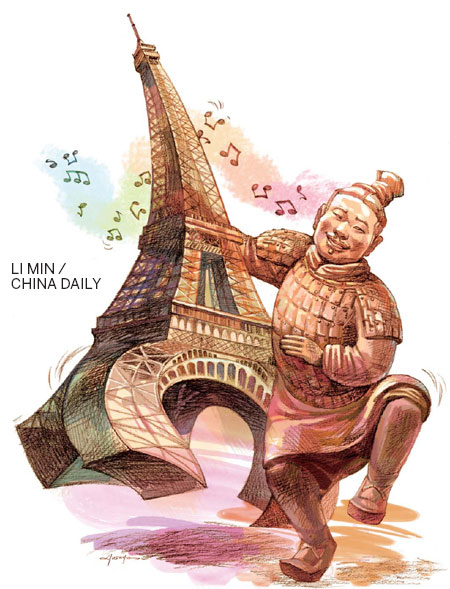A fresh start
Updated: 2013-04-19 09:32
By Li Xiang in Paris (China Daily)
|
|||||||||||

Hollande's China visit to pave the way for stronger bilateral exchanges
French President Francois Hollande's forthcoming visit to China in many ways is also an important landmark as he will be the first head of state from a major Western nation to visit after China's new leadership assumed office in March. It is also Hollande's first trip to China.
The French president, accompanied by a strong political and business delegation, will hold talks with President Xi Jinping and Premier Li Keqiang. Hollande is also scheduled to visit the Forbidden City in Beijing and deliver a keynote speech at a university in Shanghai.
"The Sino-French relationship has been rather unstable or even erratic under (former) president Nicolas Sarkozy. So what is expected from Hollande's visit to Beijing is a stabilization of the relationship and the beginning of a 'new era' based on mutual trust," says Francoise Nicolas, director of the Center for Asia Studies at the French Institute of International Relations in Paris.
"The visit will merely be the first step, but it will set the tone for the future. So it is extremely important given the current economic difficulties faced by France," she says.
Hollande is facing an uphill battle at home as the stagnation of the French economy and the stubbornly high unemployment rate have driven his domestic approval rating to a record low of 27 percent.
Although the French side has been trying to tone down the expectations of any huge contracts to be signed during the visit, economic diplomacy will clearly be the card Hollande will play when he meets with Chinese leaders.
Analysts say that rebalancing trade and investment relations with China will be at the heart of Hollande's discussion with Chinese leaders apart from seeking major deals for French companies in aviation, aerospace and nuclear sectors.
In 2012, France had a trade deficit of 21 billion euros with China, which accounts for 40 percent of the country's total trade deficit, according to official French figures. However, China Customs figures reflect a deficit of $2.8 billion. There is also an investment gap between the two sides as the value of French investment in China is three to four times more than that of China in France, according to the French Ministry of Economy and Finance.
Some French politicians have blamed the current trade and investment imbalances as a result of unfair competition from China and the nation's manipulation of its currency.
|
||||
"Such an approach is probably not the best way to push France's interests and to get China to cooperate," Nicolas says. "In fact, French Finance Minister Pierre Moscovici has urged Chinese firms to come and invest in France suggesting that the two countries share common interests."
Paris has been keen on promoting French exports and helping French companies gain greater access to sectors such as transportation, energy and urban services in the Chinese market.
"France is seeking to rebalance its trade relations with China not through trade protectionism but through better communication and win-win adjustment in commercial relations," says Paul Jean-Ortiz, Hollande's diplomatic adviser.
The value of China's imports from France reached $24.12 billion (18.45 billion euros) in 2012, a substantial increase of 9.3 percent from the previous year, according to data provided by the Ministry of Commerce.
Experts say Hollande is also likely to encourage more French exports in sectors such as agriculture and food processing.
"It is a big issue on the French agenda to make China an important export destination," says Jonathan Holslag, a research fellow at the Brussels Institute of Contemporary China Studies.
Related Stories
Airbus looks to upstage Boeing with more deliveries in China 2013-04-19 09:32
French chic is still the top pick 2013-04-19 09:32
Toward better understanding 2013-04-19 09:32
It is time to set aside differences 2013-04-19 09:32
Today's Top News
List of approved GM food clarified
ID checks for express deliveries in Guangdong
Govt to expand elderly care
University asks freshmen to sign suicide disclaimer
Tibet gears up for new climbing season
Media asked to promote Sino-Indian ties
Shots fired at Washington Navy Yard
Minimum growth rate set at 7%
Hot Topics
Lunar probe , China growth forecasts, Emission rules get tougher, China seen through 'colored lens', International board,
Editor's Picks

|

|

|

|

|

|









